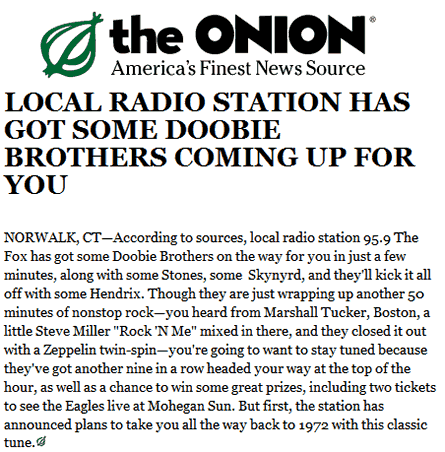
Jacobs Media consultant, Mike Stern, is always on the lookout for how radio personalities, hosts, and shows can get that special edge when it comes to prepping and producing content.
Oftentimes, the best approach is to venture outside radio to find brands, teams, and ensembles for inspiration. “Saturday Night Live” has long been a fertile source of great writing and comedic execution, but in today’s post, Mike takes a different path to strike comedic and satirical gold. – FJ
Before we start, a short break for the latest news headlines:
Curiosity Rover Finds 5 Bucks on Mars
Sheryl Sandberg’s MIT Commencement Address Clearly References Personal Data Of Individual Graduating Students
Ovechkin Knocks Out Rest Of Teeth While Kissing Stanley Cup
If these look vaguely familiar to you, it’s probably because you are a fan of the parody news site, The Onion. For those of you have never experienced this well-oiled satire machine, according to their website, “The Onion is the world’s leading news publication, offering highly acclaimed, universally revered coverage of breaking national, international, and local news events. Rising from its humble beginnings as a print newspaper in 1756, The Onion now enjoys a daily readership of 4.3 trillion and has grown into the single most powerful and influential organization in human history.”
Yes, this is fake news – brilliantly done.
The Onion is a news satire organization that began as a weekly print publication in 1988 out of Madison Wisconsin and migrated to online-only publication in 2013. As most radio hosts know all too well, generating topical, funny content on a daily basis is not easy. Which is why I was intrigued by a recent Hubspot article by Eddie Shleyner titled, “10 Universal Writing Rules from The Onion’s Founding Editor.” It features an interview with Scott Dikkers, one of The Onion’s founders and longest-serving editor-in-chief.
Dikkers is promoting his new book, How to Write Funny, and in the story, he shares tips on what it takes to write great satire. And to no one’s surprise, many of his suggestions relate directly to creating great content for the radio.
Here are five of the most important lessons he shared that go to the heart of making compelling radio:
1. Great headlines matter
Dikkers picked up on this lesson when The Onion was a merely a fledgling print publication no one cared about. He learned they had to grab people’s attention with the headline so they were laughing before they even picked up the paper. Now, in the Internet (and PPM) age he notes there are so many media options it’s more important than ever for the headline to grab a reader’s (listener’s) attention. It’s the same on the radio or in podcasts. Hosts have to start breaks or content with a compelling headline or listeners will punch out. Get their attention before they have time to press the button.

2. Shorter is better
If you’re an on-air host I’m sure you’ve heard this at least a couple hundred times. But beyond respecting the reader’s (listener’s) time by cutting unnecessary details and slop, Dikkers says there may be more value to editing than just brevity.
“Sometimes after you cut everything you could, you realize you weren’t really saying anything at all,” which is valuable information. If you don’t have a clear message, “Why are you (talking) in the first place?”
3. Be specific
While sticking to the pertinent details and cutting the fat is important, so is being as specific as possible. That’s because it’s the details – those little pieces of imagery – that help paint the picture that results in the listener having an emotional reaction to your content.
And that’s always the goal, to conjure an emotional response. That’s what compels someone to take action: to laugh, to hit the “like” button, or in radio’s case, to listen more often and/or for a longer period of time.

4. Don’t fall in love (with your ideas)
Dikkers describes this emotional phenomenon as becoming so attached to a concept, a bit, or material, you’re unwilling to hear feedback or move onto something new and different. And on the radio, that can be a problem.
The Onion’s editor says falling in love with your stuff will hold you back from giving the audience what they want or need from your show. That’s because you’re holding on to weaker ideas. Remember to serve the audience, not yourself.
The corollary, of course, is that radio talent often drops a bit or benchmark because they tire of it. Meantime, it’s one of the audience’s favorites. Being in touch with what the audience is telling you about your content brings you that much closer to a better understanding of what works – and what doesn’t.
5. Be accessible
If content is too dense, complicated or confusing, most people will not take the time to consume it. Bits, benchmarks, and skits should have “an easy on-ramp” and should reference “things that people can understand without caveats or prerequisites,” according to Dikkers.
If the readers (or our listeners) have to interpret the underlying meaning of your content, it has no place in today’s short attention span world.
Five great pieces of advice for radio humorists and entertainers that go to the heart of creating great content. The Hubspot article ends with Dikkers sharing one final piece of advice: be in control. He says, “Readers want to know they’re in the hands of a master who is going to manipulate them the way Spielberg does in his movies. He takes you on a ride, through the highs and lows.”
He continues, “Audiences love that. Readers love that. They want to be taken for that ride.”
And so do your listeners.
Speaking of talent, we are in the process of analyzing the first-ever research survey conducted among radio talent. AQ is a joint project between Jacobs Media and Morning Show Boot Camp. The results will be presented at MSBC’s historic 30th annual convention, next month in Chicago. Information here.
- Does Your Radio Station Need A Princess? - December 17, 2024
- With A Name Like Smucker’s… - December 10, 2024
- Kondo And Romo:The Pros And Cons Of Regression - February 10, 2023




Anyone remember Onion News Briefs (or whatever they were called) airing on the radio a decade or so ago? KQIZ in Amarillo would use them in breaks during their syndicated talk shows. It sounded a bit odd, considering it was a conservative talk format, but they were funny bits that enhanced a sometimes stodgy station.
I remember them vaguely. It was hard to reproduce what they do in that format.
Thanks for reading.